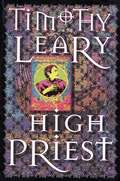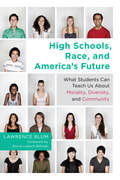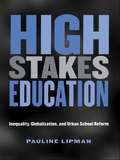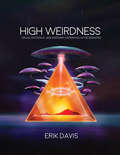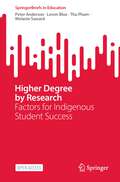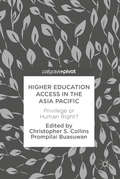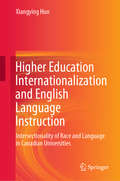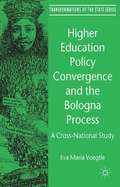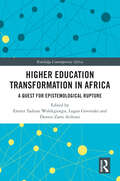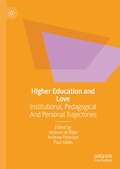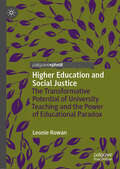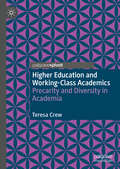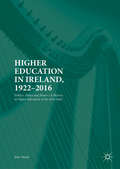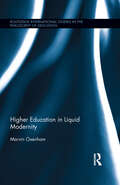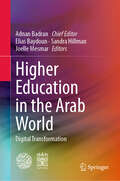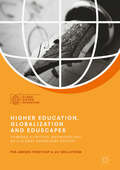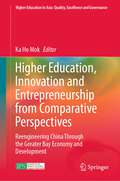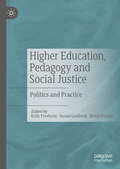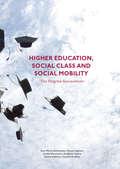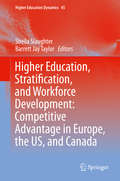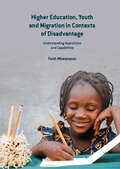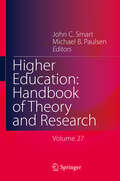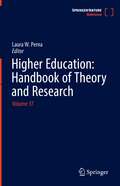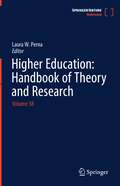- Table View
- List View
High Priest
by Timothy LearyTimothy Leary, the visionary Harvard psychologist who became a guru of the 1960s counterculture, reentered as an icon of new edge cyberpunks.HIGH PRIEST chronicles 16 psychedelic trips taken in the days before LSD was made illegal. The trip guides or "High Priests" include Aldous Huxley, Gordon Wasson, William S. Burroughs, Godsdog, Allen Ginsberg, Ram Dass, Ralph Metzner, Willy (a junkie from New York City), Huston Smith, Frank Barron, and others. The scene was Millbrook, a mansion in Upstate New York, that was the Mecca of Psychedellia during the 1960s, and of the many luminaries of the period who made a pilgrimage there to trip with Leary and his group, The League for Spiritual Discovery. Each chapter includes an I-Ching reading, a chronicle of what happened during the trip, marginalia of comments, quotations, and illustrations.A fascinating window into an era. This edition includes a Foreword by Allen Ginsberg, an introduction by Timothy Leary about the intergenerational counterculture, and illustrations by Howard Hallis.
High Schools, Race, and America's Future: What Students Can Teach Us About Morality, Diversity, and Community
by Gloria Ladson-Billings Lawrence BlumIn High Schools, Race, and America's Future, Lawrence Blum offers a lively account of a rigorous high school course on race and racism. Set in a racially, ethnically, and economically diverse high school, the book chronicles students' engagement with one another, with a rich and challenging academic curriculum, and with questions that relate powerfully to their daily lives. Blum, an acclaimed moral philosopher whose work focuses on issues of race, reflects with candor, insight, and humor on the challenges and surprises encountered in teaching--the unexpected turns in conversation, the refreshing directness of students' questions, the "aha" moments and the awkward ones, and the paradoxes of his own role as a white college professor teaching in a multiracial high school classroom. High Schools, Race, and America's Future provides an invaluable resource for those who want to teach students to think deeply and talk productively about race.
High Schools, Race, and America's Future: What Students Can Teach Us About Morality, Diversity, and Community
by Lawrence BlumIn High Schools, Race, and America&’s Future, Lawrence Blum offers a lively account of a rigorous high school course on race and racism. Set in a racially, ethnically, and economically diverse high school, the book chronicles students&’ engagement with one another, with a rich and challenging academic curriculum, and with questions that relate powerfully to their daily lives. Blum, an acclaimed moral philosopher whose work focuses on issues of race, reflects with candor, insight, and humor on the challenges and surprises encountered in teaching—the unexpected turns in conversation, the refreshing directness of students&’ questions, the &“aha&” moments and the awkward ones, and the paradoxes of his own role as a white college professor teaching in a multiracial high school classroom. High Schools, Race, and America&’s Future provides an invaluable resource for those who want to teach students to think deeply and talk productively about race.
High Stakes Education: Inequality, Globalization, and Urban School Reform (Critical Social Thought)
by Pauline LipmanNoted scholar Pauline Lipman explores the implications of education accountability reforms, particularly in urban schools, in the current political, economic, and cultural context of intensifying globalization and increasing social inequality and marginalization along lines of race and class.
High Weirdness: Drugs, Esoterica, and Visionary Experience in the Seventies
by Erik DavisAn exploration of the emergence of a new psychedelic spirituality in the work of Philip K. Dick, Terence McKenna, and Robert Anton Wilson.A study of the spiritual provocations to be found in the work of Philip K. Dick, Terence McKenna, and Robert Anton Wilson, High Weirdness charts the emergence of a new psychedelic spirituality that arose from the American counterculture of the 1970s. These three authors changed the way millions of readers thought, dreamed, and experienced reality—but how did their writings reflect, as well as shape, the seismic cultural shifts taking place in America? In High Weirdness, Erik Davis—America's leading scholar of high strangeness—examines the published and unpublished writings of these vital, iconoclastic thinkers, as well as their own life-changing mystical experiences. Davis explores the complex lattice of the strange that flowed through America's West Coast at a time of radical technological, political, and social upheaval to present a new theory of the weird as a viable mode for a renewed engagement with reality.
Higher Degree by Research: Factors for Indigenous Student Success (SpringerBriefs in Education)
by Peter Anderson Levon Blue Thu Pham Melanie SawardThis open access book provides insights from Indigenous higher degree research (HDR) students on supervision practices in an Australian context. It examines findings from qualitative studies conducted with Indigenous HDR students from different academic disciplines, enrolled higher education institutions across Australia, and supervisors of Indigenous HDR students. Six types of data and their thematic analyses are presented, to understand the needs and experiences of both Indigenous HDR students and supervisors of Indigenous HDR students. This book also unpacks assumptions and commonly held beliefs about Indigenous HDR students, and shares what Indigenous HDRs report they need to experience success in higher education. It reports the experiences of supervisors of Indigenous HDR students, and explore further opportunities which enhance the higher education experiences of Indigenous HDR students. This book also suggests how successful relationships between Indigenous HDR students, and their supervisors may be fostered, and aims to be a useful resource for Indigenous peoples wishing to pursue higher education, and HDR supervisors in countries with Indigenous populations.
Higher Education Access in the Asia Pacific
by Prompilai Buasuwan Christopher S. CollinsThis edited volume offers empirical, evaluative, and philosophical perspectives on the question of higher education as a human right in the Asia Pacific. Throughout the region, higher education has grown rapidly in a variety of ways. Price, accessibility, mobility, and government funding are all key areas of interest, which likely shape the degree to which higher education may be viewed as a human right. Although enrollments continue to grow in many higher education systems, protests related to fees and other equity issues continue to grow. This volume will include scholarly perspectives from around the region for a more extensive understanding of higher education as a human right in the Asia Pacific.
Higher Education Internationalization and English Language Instruction: Intersectionality of Race and Language in Canadian Universities
by Xiangying HuoThis book offers new understanding of the implications of pluralism and of transnational movements to higher education and the construct of a “native speaker” within contemporary globalization processes. Theoretically, it calls for a revisioned English as an International Language (EIL) pedagogy and a wider acceptance of EIL and of World Englishes. It challenges the postsecondary education sector to change the discourse around language proficiency to one that engages the “pluralism of English.” As for the applied significance, the book contributes to the work on neo-racism which means racism goes beyond color to stereotypic foreign cultures, nationalities, and exotic accents based on cultural distinctions instead of merely skin differences. The book contributes to higher education policy and practice, pushing a revisioning of ESL in conceptual and pedagogical ways, such as designing more culturally oriented curriculum, implementing culturally responsive pedagogy, and valuing the teaching proficiency more than the language proficiency.
Higher Education Policy Convergence and the Bologna Process: A Cross-National Study (Transformations of the State)
by Eva Maria VögtleWhat are the principal drivers of recent higher education reforms? This study investigates whether the soft governance mechanism of transnational communication has evoked cross-national policy harmonization. Results suggest that the Bologna Process has triggered substantial policy harmonization beyond general policy convergence.
Higher Education Transformation in Africa: A Quest for Epistemological Rupture (ISSN)
by Emnet Tadesse Woldegiorgis, Logan Govender and Dennis Zami AtibuniThis book critically interrogates the notion of transformation in higher education, focusing on epistemological and structural issues in postcolonial and contemporary Africa.The book considers the multifaceted challenges facing higher education in the continent and uses the concept of transformation as a common thread weaving through a range of issues, including epistemology, identity, relevance, research, collaboration and decoloniality. Arguing for a holistic approach towards progressive and innovative education systems, the book calls for a fundamental transformation that expands access, enhances quality and competitiveness, addresses past injustices and improves the capacity to act together for a more sustainable and just future. Overall, the book makes a powerful case for the power of transformation in higher education to shape the social, economic and cultural fabric of society.This book’s critical evaluation of knowledge production in Africa will be an important read for researchers and policymakers involved in Africa’s higher education sector.
Higher Education and Love: Institutional, Pedagogical and Personal Trajectories
by Andrew Peterson Paul Gibbs Victoria De RijkeThis book explicitly unites the concepts of higher education and love to examine how these concepts are mutually compatible. As the world of higher education moves towards the metrics of value, and the worth of knowledge becomes more valued in its use rather than its discovery, a crisis brews. If higher education is to contribute to the wellbeing of the self and of others, then the institution needs to be radically reviewed to see if, and how, love contributes to higher education within and beyond its walls. This book addresses the core question of what would the university might be like, today and into the future, if the timeless notion of love was the basis of its educative process, notwithstanding the material artefacts the university helps to create, but also as a way of framing approaches to higher education.
Higher Education and Social Justice: The Transformative Potential of University Teaching and the Power of Educational Paradox
by Leonie RowanThis book demonstrates how the pedagogical decision making of university academics can be shaped by engagement with an educational philosophy known as “relationship-centred education”. Beginning with critical analysis of concepts such as student engagement, student satisfaction, and student-centred learning, the author goes on to investigate how literature relating to social justice challenges educators to consider these terms in particular ways. From this basis, the book explores the factors featuring in inclusive, respectful, diverse and student-centred environments. In analysing these factors, the author illuminates the perspectives of university teachers who struggle with the unique challenges of working in the academy; including an increasingly broad set of employment demands and narrower criteria for determining ‘impact’, all while retaining focus on the transformative potential of higher education. This book will be of interest to students and scholars of transformative learning, as well as social justice within higher education.
Higher Education and Working-Class Academics: Precarity and Diversity in Academia
by Teresa CrewThis book examines how a working-class habitus interacts with the elite culture of academia in higher education. Drawing on extensive qualitative data and informed by the work of Pierre Bourdieu, the author presents new ways of examining impostor syndrome, alienation and microaggressions: all common to the working-class experience of academia. The book demonstrates that the term ‘working-class academic’ is not homogenous, and instead illuminates the entanglements of class and academia. Through an examination of such intersections as ethnicity, gender, dis/ability, and place, the author demonstrates the complexity of class and academia in the UK and asks how we can move forward so working-class academics can support both each other and students from all backgrounds.
Higher Education in Ireland, 1922–2016: Politics, Policy and Power—A History of Higher Education in the Irish State
by John WalshThis book explores the emergence of the modern higher education sector in the independent Irish state. The author traces its origins from the traditional universities, technical schools and teacher training colleges at the start of the twentieth century, cataloguing its development into the complex, multi-layered and diverse system of the early twenty-first century. Focusing on the socio-political and cultural contexts which shaped the evolution of higher education, the author analyses the interplay between the state, academic institutions and other key institutional actors – notably churches, cultural organizations, employers, trade unions and supranational bodies. This study explores policy, structural and institutional change in Irish higher education, suggesting that the emergence of the modern higher education system in Ireland was influenced by ideologies and trends which owed much to a wider European and international context. The book considers how the exercise of power at local, national and international level impinged on the mission, purpose and values of higher education and on the creation and expansion of a distinctive higher education system. The author also explores a transformation in public and political understandings of the role of higher education, charting the gradual evolution from traditionalist conceptions of the academy as a repository for cultural and religious value formation, to the re-positioning of higher education as a vital factor in the knowledge based economy. This comprehensive volume will appeal to students and scholars of the Irish education system, educators and practitioners in the field, and those interested in higher education in Ireland more generally.
Higher Education in Liquid Modernity (Routledge International Studies in the Philosophy of Education #30)
by Marvin OxenhamBased in sociologist Zygmunt Bauman’s theory of liquid modernity, this volume describes and critiques key aspects and practices of liquid education--education as market-driven consumption, short life span of useful knowledge, overabundance of information--through a systematic comparison with ancient Greek paideia and medieval university education, producing a sweeping analysis of the history and philosophy ofeducation for the purpose of understanding current higher education, positing a more holisitic alternative model in which students are embedded in a learning commutity that is itself embedded in a larger society. If liquid modernity has left a vacuum where, according to Bauman, the pilot’s cabin is empty, this volume argues that no structure is better positioned to fill this vacuum than the university and outlines a renewed vision of social transformation through higher education.
Higher Education in the Arab World: Digital Transformation
by Elias Baydoun Adnan Badran Joelle Mesmar Sandra HillmanThis book provides a comprehensive insight and roadmap to accelerate the implementation of digital transformation (DX) within Arab Universities along with an understanding of the challenges that accompany such change. It explores the elements of DX in universities and presents case studies and experiences from Arab Universities along with recommendations that facilitate the use of DX in higher education. Within the Arab region, the potential for digitization within the higher education landscape has significant outcomes and impacts on the growth, progression, and development of this sector. Digital transformation allows universities to respond to change while fostering a student-centered approach and remaining relevant to the growing demands of the twenty-first century. It also improves the universities activities such as teaching and learning, curricula development and implementation, processes, operations, support services, and infrastructure. This increases the university’s competitive advantage locally and internationally. Embracing and adopting DX requires a paradigm shift in a university’s strategy and culture. The Arab world is home to more than 1,000 universities and in excess of 13 million students, and its higher education system offers a diverse range of undergraduate and postgraduate programs. To continue our series of books on higher education, we propose that the theme of this 8th book should be “Higher Education in the Arab World: Digital Transformation” in universities. In a complex regional and global climate, this book provokes a rich exploration of ideas around the challenges surrounding this sector and how to address them.
Higher Education, Globalization and Eduscapes: Towards A Critical Anthropology Of A Global Knowledge Society (Palgrave Studies in Global Higher Education)
by Per-Anders Forstorp Ulf MellströmThis book examines transnational scapes and flows of higher education: arguing that the educational and political vision of a national, regional and global knowledge society needs to be perspectivized beyond its ethnocentric conditions and meanings. Using eduscapes as its most important concept, this book explores the educational landscapes of individual as well as institutional actors; particularly the agential aspects of how global eduscapes are imagined, experienced, negotiated and constructed. In addition, the authors highlight the critical potential of anthropology, using this perspective as a resource for cultural critique where the Western experience and assumed ‘ownership’ of the global knowledge economy will be put into question. This comprehensive book will appeal to students and scholars of educational policy, the sociology of education and the globalization of education.
Higher Education, Innovation and Entrepreneurship from Comparative Perspectives: Reengineering China Through the Greater Bay Economy and Development (Higher Education in Asia: Quality, Excellence and Governance)
by Ka Ho MokThis book analyzes how universities in the Greater Bay Area in South China could work together for promoting innovation-centric entrepreneurship, research and knowledge transfer, as well as establishing a leading higher education hub in China mainland. This book brings together leading scholars from history, higher education, sociology, city and urbanism, and development studies, to analyzing the role of higher education, entrepreneurship, and talent hub from historical, comparative, and international perspectives. This book also shares different development experiences of Tokyo, Florida, and New York Bay economies and how higher education has supported their success stories.
Higher Education, Pedagogy and Social Justice: Politics and Practice
by Helen Proctor Susan Goodwin Kelly FreebodyThis book explores how the concepts of social justice, diversity, equity and inclusion can be understood within the context of higher education. While terms such as these are often in common use in universities, they are not always used with clarity and precision. The editors and contributors offer a serious and detailed examination of pressing contemporary concerns around ‘social justice’ across politics, practice and pedagogy in order to encourage hard thinking and practical agenda setting for social-justice oriented research, teaching and community engagement. Drawing upon new theoretical work, research projects and innovative university teaching, this book offers both useful theoretical insights and practical possibilities for action. This collective and collaborative volume will be of interest and value to all those interested in promoting social justice, in particular how it can be promoted within the university setting.
Higher Education, Social Class and Social Mobility
by Harriet Bradley Ann-Marie Bathmaker Nicola Ingram Jessie Abrahams Anthony Hoare Richard WallerThis book explores higher education, social class and social mobility from the point of view of those most intimately involved: the undergraduate students. It is based on a project which followed a cohort of young undergraduate students at Bristol's two universities in the UK through from their first year of study for the following three years, when most of them were about to enter the labour market or further study. The students were paired by university, by subject of study and by class background, so that the fortunes of middle-class and working-class students could be compared. Narrative data gathered over three years are located in the context of a hierarchical and stratified higher education system, in order to consider the potential of higher education as a vehicle of social mobility.
Higher Education, Stratification, and Workforce Development
by Sheila Slaughter Barrett Jay TaylorThis work analyses how political economic shifts contribute to competition within higher education systems in the US, EU, and Canada. The authors highlight competition for prestige and public and private subsidies, exploring the consequences of these processes through theoretical and empirical analyses. Accordingly, the work highlights topics that will be of interest to a wide range of audiences. Concepts addressed include stratification, privatization of formerly public subsidies, preference for "high tech" academic fields, and the vocationalization of the curriculum (i. e. , Science, Technology, Engineering and Mathematics: [STEM] fields, selected professions, and business) rather than the liberal arts or the Humboldtian vision of the university. Across national contexts and analytic methods, authors analyze the growth of national policies that see universities as a sub set of economic development, casting universities as corporate research laboratories and education as central to job creation. Throughout the volume, the authors make the case that national and regional approaches to politics and markets result in different experiences of consequences of academic capitalism. While these shifts serve the interests of some institutions, others find themselves struggling to meet ever-greater expectations with stagnant or shrinking resource bases.
Higher Education, Youth and Migration in Contexts of Disadvantage: Understanding Aspirations and Capabilities
by Faith MkwananziThis book explores the lives, experiences and the formation of higher educational aspirations among marginalised migrant youth in South Africa. Using a case study based in Johannesburg, the author illuminates their voices in order to demonstrate the reality faced by these young people in the context of migration to the Global South. Within the complex landscape of global and African migration, this book draws on detailed narratives to understand the conditions under which aspirations for higher education are – or are not – developed. In doing so, the author highlights the value of understanding individual lives, experiences and opportunities from a human development point of view, capturing the multidimensional disadvantages experienced by migrants in a balanced, intersectional manner. Balancing empirical data with theoretical analysis, this volume tells a rich, nuanced story about marginalised migrant youth – an essential work for understanding the conditions necessary for such youth to live valuable lives in both local and international contexts. This book will appeal to students and scholars of youth migration, aspiration and educational opportunities, particularly within the Global South.
Higher Education: Handbook of Theory and Research
by John C. Smart Michael B. PaulsenPublished annually since 1985, the Handbook series provides a compendium of thorough and integrative literature reviews on a diverse array of topics of interest to the higher education scholarly and policy communities. Each chapter provides a comprehensive review of research findings on a selected topic, critiques the research literature in terms of its conceptual and methodological rigor, and sets forth an agenda for future research intended to advance knowledge on the chosen topic. The Handbook focuses on twelve general areas that encompass the salient dimensions of scholarly and policy inquiries undertaken in the international higher education community. The series is fortunate to have attracted annual contributions from distinguished scholars throughout the world.
Higher Education: Volume 37 (Higher Education: Handbook of Theory and Research #37)
by Laura W. PernaPublished annually since 1985, the Handbook series provides a compendium of thorough and integrative literature reviews on a diverse array of topics of interest to the higher education scholarly and policy communities. Each chapter provides a comprehensive review of research findings on a selected topic, critiques the research literature in terms of its conceptual and methodological rigor and sets forth an agenda for future research intended to advance knowledge on the chosen topic. The Handbook focuses on a comprehensive set of central areas of study in higher education that encompasses the salient dimensions of scholarly and policy inquiries undertaken in the international higher education community. Each annual volume contains chapters on current important issues pertaining to college students and faculty, organization and administration, curriculum and instruction, policy, diversity issues, economics and finance, history and philosophy, community colleges, advances in research methodology and other key aspects of higher education administration. The series is fortunate to have attracted annual contributions from distinguished scholars throughout the world.
Higher Education: Volume 38 (Higher Education: Handbook of Theory and Research #38)
by Laura W. PernaPublished annually since 1985, the Handbook series provides a compendium of thorough and integrative literature reviews on a diverse array of topics of interest to the higher education scholarly and policy communities. Each chapter provides a comprehensive review of research findings on a selected topic, critiques the research literature in terms of its conceptual and methodological rigor and sets forth an agenda for future research intended to advance knowledge on the chosen topic. The Handbook focuses on a comprehensive set of central areas of study in higher education that encompasses the salient dimensions of scholarly and policy inquiries undertaken in the international higher education community. Each annual volume contains chapters on current important issues pertaining to college students and faculty, organization and administration, curriculum and instruction, policy, diversity issues, economics and finance, history and philosophy, community colleges, advances in research methodology and other key aspects of higher education administration. The series is fortunate to have attracted annual contributions from distinguished scholars throughout the world.
